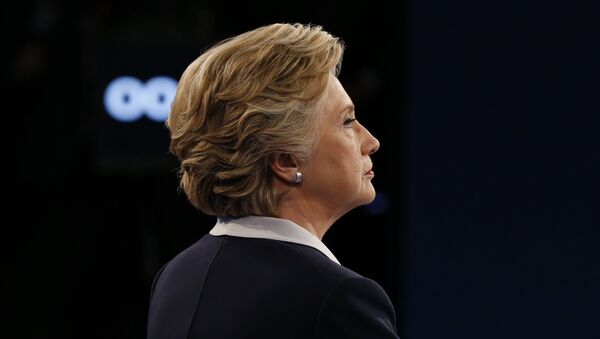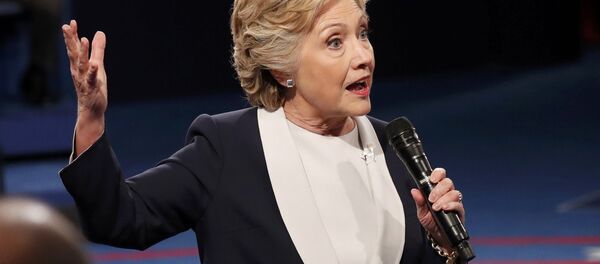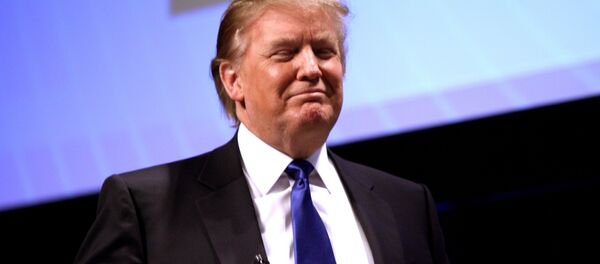They also mulled over methods to mislead the press and the public about the content of her speeches – revealing her campaign staff’s milquetoast definition of “speaking truth to power."
Sputnik's Unanimous Dissent hosts Sam Sacks and Sam Knight parse some of the emails from Clinton's speechwriters and campaign officials.
In the emails, we learn for the first time some of what Clinton told bankers in her private, well-paid speeches. We already know that what she says in private doesn’t match what she proclaims in public, Knight points out. She's critical of fracking as a candidate, but boasts about spreading fracking around the world when talking to Wall Street. In public she says Syrian civilians need a no-fly zone to protect them; to bankers, she said it would lead to civilian deaths.
Now we see her campaign once again trying to manipulate journalists. First flagged by Zaid Jilani at The Intercept, the latest Podesta emails contain a telling exchange between Clinton speechwriter Dan Schwerin and other campaign officials in which Schwerin suggests the campaign leak a portion of one of Clinton’s speeches in which she's "tough on Wall Street" as a defense, to show that behind closed doors, the establishment candidate can still be counted on to be critical.
And, wouldn't you know, he's got just the excerpt for the job: Schwerin reveals that he actually wrote a section of a speech Clinton gave to Deutsche Bank, for which the candidate was paid $260,000, entirely for the purpose of giving the campaign 'evidence' of the former US secretary of state taking on big banks.
"Following up on the conversion this morning about needing more arrows in our quiver on Wall Street, I wanted to float one idea," Schwerin wrote. "In October 2014, [Hillary Clinton] did a paid speech in New York for Deutsche Bank. I wrote her a long riff about economic fairness and how the financial industry has lost its way, precisely for the purpose of having something we could show people if ever asked what she was saying behind closed doors for two years to all those fat cats."
It's not as "tough or pointed as we would write now," he admits, "but it's much more than people would assume she was saying in speeches."
As Knight points out, this is the campaign explicitly conspiring to deceive voters about the substance of her Wall Street speeches and using planted passages in a speech to throw off reporters looking into the inconsistency of her position to Wall Street and the public.
Schwerin goes on to describe the excerpt, to form the basis for a friendly story. "Upside would be that when people say she’s too close to Wall Street and has taken too much money from bankers, we can point to evidence that she wasn't afraid to speak truth to power. Downside would be that we could then be pushed to release transcripts from all her paid speeches, which would be less helpful though probably not disastrous … "
Clinton campaign press secretary Brian Fallon liked this idea, a lot. He took it to a new level: "I think we could come up with a vanilla characterization that challenges the idea that she sucked up to these folks in her appearances," he wrote. He suggested pitching journalists an "exclusive" based on key excerpts from this particular Deutsche Bank speech – which the campaign would supply, of course.
"In doing so, we could have the reporting be sourced to a transcript obtained by a news outlet, so it is not confirmed as us selectively providing one transcript while refusing to share the others,' Fallon suggested.
This is deception, Knight points out. It's what all campaigns do – but it does show that even while the Clinton campaign was saying over and over that the paid Wall Street speeches were not damaging, they were in private clearly worried about the speeches and were actively trying to satiate the media with planted and hand-picked excerpts.
This particular scheme, however, did not succeed, as someone on Clinton's team was in touch enough to notice that this shining example of Clinton taking the fight to Wall Street was in fact pretty disappointing. Schwerin's great plant was simply Clinton quoting Chicago Mercantile Exchange Chair Terry Duffy that, "some Wall Streeters can too easily slip into regarding their work as a kind of money-making game divorced from the concerns of main street."
That's it. Mildly critical words that were not even her mildly critical words: that’s the excerpt the campaign sought to leak to put all the questions to rest.
Clinton's Senior Communications Advisor Mandy Grunwald put a halt to the plan.
"I worry about going down this road,” she wrote. "First, the remarks below make it sound like [Hillary Clinton] doesn’t think the game is rigged, only that she recognizes that the public thinks so. They are very angry; she isn't."
"Second, once you start looking at speeches, you run smack into Maggie Haberman's report on Politico on [Clinton’s] Goldman Sachs speech in which [Clinton] isn't quoted directly but described as saying 'people shouldn't be vilifying Wall Street.' Maybe you think the Deutsche Bank speech takes the sting out of that Goldman report, but I am concerned that the passage below will exacerbate, not improve, the situation."
Of course, in a political race against a male candidate with sexual offense accusations piling up almost by the day, these emails cannot do much to hurt her. But as Sacks points out, for progressives, these emails should be cause for concern. They will not impact the general election, but people will remember them.





